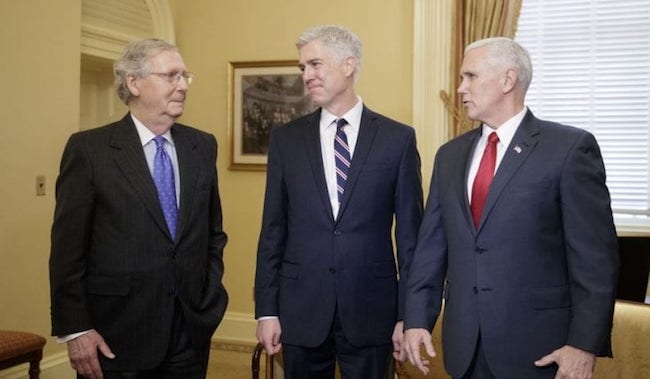As Gorsuch Nomination Battle Rages On, GOP Sparks the "Nuclear Option"
/As reported by CNN today, discussions and attempts to broker a bipartisan deal have failed regarding Supreme Court nominee Neil Gorsuch. Although senators from both sides fear the repercussions of allowing a simple majority vote to confirm new judiciary appointees, that appears to be the only viable option - at least in the eyes of Mitch McConnell and other key Republicans.
What does this mean in terms of senatorial processes in the immediate future? McConnell will implement a motion to vote on altering current Senate rules outlining confirmation procedures. This would trigger a Senate roll-call vote, which would require a simple majority to pass. Should that happen, a final vote on Gorsuch's nomination would be held on Friday.
It is important to note that the rule change vote has been criticized by both sides of the aisle. Given that Republicans hold a slight 52-48 majority, it is crucial that no more than three Republican senators stray from party lines. Due to the fact that key figures from each side met attempting to avoid the nuclear option, that motion could be fragile.
Of course, this all takes place alongside a period of lengthy Democratic dissent following the blocked nomination of Obama appointee Merrick Garland. During a tumultuous presidential election, Senate Republicans refused to acknowledge Garland's nomination, leaving a vacant seat on the court following the passing of judge Antonin Scalia. Accordingly, Democrats feel that a seat in the Court is being stolen from them, arguing that Garland deserved a confirmation vote. Carrying forward into today, Senate Democrats, unimpressed with Gorsuch's responses at his confirmation hearing, have called for a new, more-moderate nomination; however, that option appears to be off the table.
Currently, it takes 60 votes to approve the nomination of new nominees to the Supreme Court; should the rule change be enacted, it would only require a simple majority of 51 votes to push a nominee through to the bench. The longstanding system, slated to be changed, ensures that some level of bipartisanship shapes Supreme Court nominations. With this new initiative, that spirit of cooperation - something that feels quite ironic to say in light of current Capitol Hill squabbles - is under threat.
Here is what some Republicans critical of the change had to say, citing break downs in discussions:
“This is going to be very bad. If you want to get a judge on the court you better have a majority. So this is going to haunt the Senate, it is going to change the judiciary, and it’s so unnecessary.”
“A number of us discussed it. We all wanted to do something, but we couldn’t agree on common ground. A testimony of the polarization of the Senate.”
“I’ve had midnight calls on this, 6:30 a.m. calls on this. Worked all weekend and we just couldn’t get here.”
In addition, it is not guaranteed that other Republican senators will join in solidarity, such as Senator Bob Corker - notes CNN.
Republicans were upset that Democrats in the Senate did not offer bipartisan support for the nomination, but the criticism stems from self-righteous naivity. Why would Democrats, feeling robbed of a legitimate confirmation, suddenly rush to join hands with Republicans in supporting someone they deem a far-right nominee? Time and time again, Washington has shown us that assumptions similar to these are losing propositions.
In any case, these developments serve to showcase the growing divide between Democrats and Republicans in the Senate, and on Capitol Hill as a whole. Make no mistake, this nomination procedure is simply a short-term solution that could morph into a long-term problem: complete and utter partisanship concerning governance in the United States. The Obama years saw this ideological gap increase, and the most polarizing election of our time has only served to accelerate that change.
Senate leaders need to consider these consequences with more forethought before instituting such a radical change to American politics. Taking steps now will safeguard our nation's highest court against ideological nominations, based on the chief executive's world view. Politics is a balancing act, and those scales need to tip in favor of democracy.


